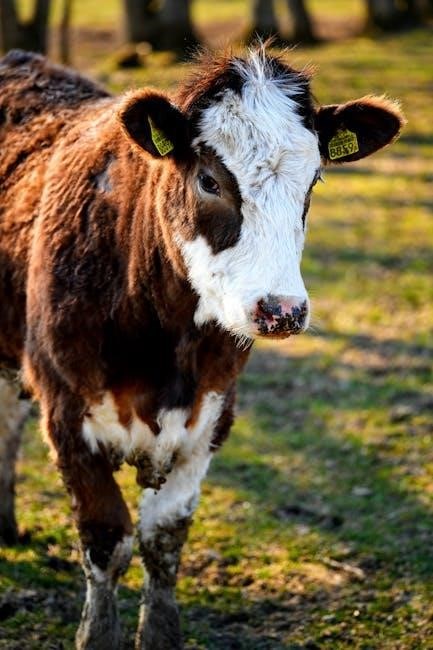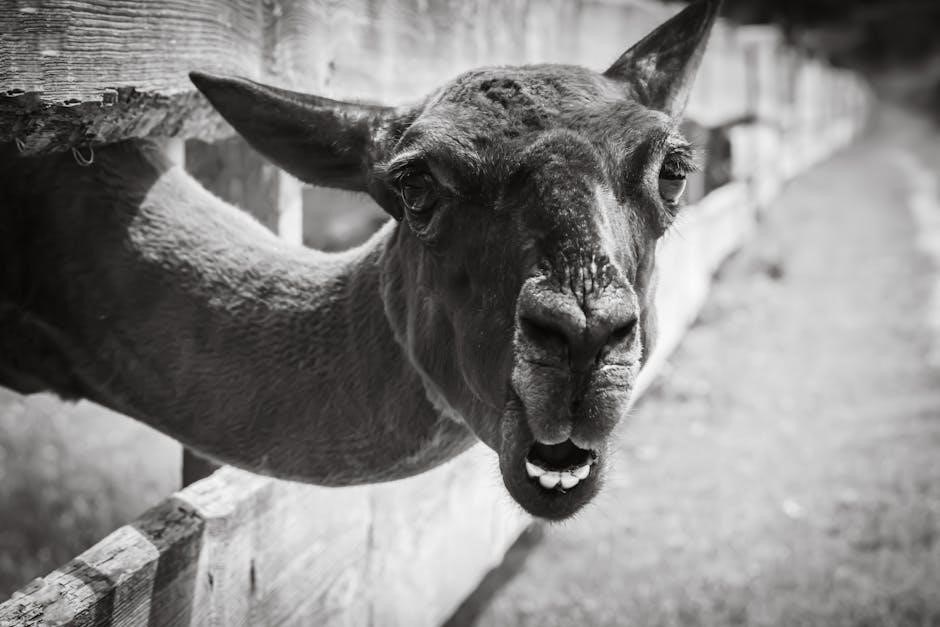Welcome to the Animal Farm study guide! This resource helps readers deepen their understanding of Orwell’s novella through comprehensive questions‚ analysis‚ and critical thinking exercises.
1.1 Overview of Animal Farm and Its Relevance
George Orwell’s Animal Farm‚ published in 1945‚ is a thought-provoking allegory of the Russian Revolution. The novella explores themes of power‚ corruption‚ and the dangers of totalitarianism through farm animals. Its timeless relevance lies in mirroring human societal dynamics‚ emphasizing the importance of critical thinking. This study guide helps readers understand these themes deeply.
1.2 Importance of Study Guides for Understanding the Novel
Study guides are essential for comprehending Animal Farm’s complex themes and allegorical meanings. They provide structured questions‚ analysis‚ and critical thinking exercises‚ helping readers grasp Orwell’s critique of power and corruption. These resources also facilitate deeper engagement with the text‚ enabling students to interpret characters‚ plot twists‚ and historical parallels effectively.
Key Characters Analysis
Explore the roles of Old Major‚ Napoleon‚ Snowball‚ and Boxer. Understand their motivations and how they shape the novel’s themes of power‚ loyalty‚ and corruption.
2.1 Old Major: The Ideological Leader
Old Major‚ the wise boar‚ inspires rebellion with his vision of Animalism. He advocates for freedom and equality‚ influencing the animals to unite against oppression. His ideology becomes the foundation of the farm’s revolution‚ shaping the characters’ beliefs and actions throughout the novel.
2.2 Napoleon and Snowball: The Struggle for Power
Napoleon and Snowball‚ two dominant pigs‚ clash as leaders of Animal Farm. Their differing ideologies spark tension‚ with Napoleon favoring authoritarian control and Snowball advocating for democratic ideals. Their power struggle culminates in Napoleon’s expulsion of Snowball‚ highlighting the corrupting influence of power and the manipulation of the farm’s ideals for personal gain.
2.3 Boxer: The Embodiment of Loyalty and Dedication
Boxer‚ a dedicated and hardworking horse‚ embodies loyalty to Animal Farm’s ideals. His unwavering commitment to the farm’s success‚ exemplified by his motto “I will work harder‚” makes him a symbol of integrity. However‚ his blind loyalty leads to exploitation‚ highlighting the tragic consequences of unquestioning devotion to authority and the erosion of ideals over time.
Major Themes in Animal Farm
This section explores the major themes of Animal Farm‚ including the allegory of the Russian Revolution‚ the corruption of power‚ and the role of propaganda.
3.1 The Allegory of the Russian Revolution
Animal Farm mirrors the Russian Revolution through its characters and events. Old Major represents Lenin‚ while Napoleon and Snowball symbolize Stalin and Trotsky. The novel critiques totalitarianism‚ illustrating how power corrupts and ideologies are distorted. Orwell’s allegory highlights the tragic transformation from revolutionary ideals to oppressive regimes‚ reflecting historical parallels with chilling accuracy.
3.2 The Corruption of Power and Its Consequences
The pigs’ gradual seizure of power mirrors the dangers of unchecked authority. Napoleon and Snowball’s rivalry turns sinister as they manipulate the farm’s governance for personal gain. Squealer’s propaganda distorts reality‚ justifying exploitation. Boxer’s exploitation and the altering of the Seven Commandments highlight the moral decay. Orwell warns of power’s corrupting influence and its devastating societal impact.
3.3 The Role of Propaganda in Shaping Opinion
Squealer’s manipulation of language and facts exemplifies propaganda’s power. By distorting reality‚ he justifies the pigs’ exploitation‚ altering the Seven Commandments to suit their interests. Boxer’s unwavering loyalty‚ despite exploitation‚ shows how propaganda shapes perception. Orwell critiques how rhetoric can control minds‚ erode truth‚ and maintain authority‚ highlighting its insidious role in societal manipulation and control.

Study Questions and Answers
This section provides essential questions and answers to enhance understanding of the novel. It includes comprehension‚ analytical‚ and critical thinking queries‚ guiding readers through key themes and symbolism‚ ensuring a deeper grasp of Orwell’s message and the historical allegory presented in Animal Farm.
4.1 Comprehension Questions: Understanding Plot and Characters
Engage with the plot and characters through targeted questions. Why does Old Major call the meeting? What events lead to the rebellion? How do Napoleon and Snowball differ? These questions help clarify key events and character motivations‚ ensuring a solid foundation for further analysis. Use flashcards or group discussions for active learning.
4.2 Analytical Questions: Exploring Themes and Symbolism
Delve into the novel’s themes and symbols with probing questions. How does Squealer’s rhetoric shape the animals’ perceptions? What does the altering of the Seven Commandments signify? Explore the symbolism of the pigs’ corruption and Boxer’s dedication. These questions encourage deeper insights into Orwell’s critique of power and manipulation‚ enhancing your understanding of the novel’s timeless relevance.
4.3 Critical Thinking Questions: Evaluating the Novel’s Message
Evaluate the novel’s message by questioning its implications. How does Orwell critique authoritarianism through Napoleon’s rise? What commentary does the story offer on human nature? Consider the consequences of the animals’ submission to propaganda. Reflect on the universal relevance of the novel’s themes in modern society‚ encouraging a deeper understanding of its warnings about power and control.

The Significance of the Seven Commandments
The Seven Commandments serve as the moral foundation of Animalism‚ guiding the animals’ behavior and unity. They symbolize the rebellion’s ideals of equality and justice‚ forming the heart of the farm’s new society.
5.1 The Original Commandments and Their Purpose
The original Seven Commandments‚ crafted by Snowball and Napoleon‚ aimed to unify the animals under shared principles. They prohibited actions harmful to animal unity‚ such as killing another animal or engaging in human behaviors‚ ensuring equality and collective prosperity on Animal Farm.
5.2 How the Commandments Are Altered Over Time
The original Seven Commandments are gradually altered by the pigs to justify their actions and consolidate power. For instance‚ “No animal shall drink alcohol” becomes “No animal shall drink alcohol to excess‚” allowing the pigs to justify their own indulgence. These subtle changes undermine the original principles of equality and fairness‚ reflecting the pigs’ corrupt intentions.
5.3 The Impact of These Changes on the Animals
The alterations to the Seven Commandments cause confusion and disillusionment among the animals. They lose trust in their leaders as the original ideals of equality and fairness are eroded. The animals become increasingly divided‚ with some questioning the pigs’ authority‚ while others remain loyal‚ leading to a fractured and unstable community on Animal Farm.

The Role of Language and Manipulation
Language and manipulation are key tools used by the pigs to control the narrative and influence the animals’ perceptions‚ shaping their understanding of reality on Animal Farm.
6.1 Squealer’s Use of Rhetoric to Control the Narrative
Squealer masterfully employs rhetoric to manipulate the animals’ understanding of events. By using persuasive language‚ logical fallacies‚ and emotional appeals‚ he distorts reality‚ justifying the pigs’ actions and maintaining their authority. His ability to twist facts ensures the animals remain compliant‚ highlighting the power of language in shaping perception and controlling the narrative.
6.2 How the Pigs Manipulate the Truth
The pigs systematically alter facts and historical records to maintain power. They falsify documents‚ revise the Seven Commandments‚ and distort memories‚ ensuring their version of reality dominates. This manipulation prevents dissent and solidifies their control‚ showcasing how truth can be reshaped to serve authority and suppress opposition among the animals.
6.3 The Effect of Manipulation on the Animals’ Perception
The pigs’ manipulation distorts the animals’ understanding of reality‚ fostering confusion and conformity. Altered facts‚ propaganda‚ and false narratives lead to passive acceptance of their rule. Over time‚ the animals lose their ability to question authority‚ becoming reliant on the pigs’ interpretations and losing their autonomy in decision-making;
The Importance of the Final Chapter
The final chapter of Animal Farm serves as the climax‚ revealing the animals’ realization of their mistake and the blurred lines between their leader and the humans they initially rebelled against.
7.1 The Climax of the Novel and Its Implications
The climax of Animal Farm occurs when the pigs‚ now indistinguishable from humans‚ engage in a card game with neighboring farmers. This moment symbolizes the complete corruption of the revolution’s ideals and highlights the cyclical nature of power‚ leaving the animals disheartened and questioning their leaders’ true intentions.
7.2 The Animals’ Realization of Their Mistake
The animals gradually realize their mistake as the pigs’ corruption becomes undeniable. They see how the pigs exploit their power‚ altering the Seven Commandments and betraying the rebellion’s principles. This realization sparks a mix of despair and helplessness‚ as they comprehend the loss of their equality and freedom‚ mirroring the failure of their revolution.
7.3 The Ending’s Relevance to Real-World Events
The ending of Animal Farm reflects real-world events like the Russian Revolution‚ where idealistic revolutions often lead to authoritarian regimes. The pigs’ corruption mirrors historical power struggles‚ emphasizing universal themes of corruption‚ betrayal‚ and the cyclical nature of oppression. This resonance makes the novel a timeless critique of political systems and human nature.
Using a PDF Study Guide Effectively
A PDF study guide offers convenience‚ with features like search‚ highlighting‚ and accessibility across devices‚ making it easier to review and engage with course materials anytime‚ anywhere.
8.1 Tips for Active Reading and Note-Taking
Engage deeply by highlighting key themes and underlining important quotes; Use sticky notes for questions. Summarize each chapter in your own words. Organize notes thematically for better retention and quick review. Refer to discussion questions to guide your reading and focus on critical themes like power and propaganda. Stay interactive and reflective throughout your study process to enhance understanding and retention of the material effectively over time.
8.2 How to Engage with Discussion Questions
Approach discussion questions by first understanding their focus. Relate them to key themes like power dynamics or propaganda. Use evidence from the text to support your answers. Encourage collaborative discussions‚ listening to others’ perspectives. Reflect on how questions connect to real-world issues. This fosters deeper comprehension and critical thinking skills while enriching your study experience through active participation and meaningful dialogue among learners to enhance understanding and retention of the material effectively over time.
8.3 Strategies for Retaining Key Information
Summarize chapters regularly to reinforce understanding. Use flashcards for key terms and concepts. Create concept maps linking characters‚ themes‚ and events. Engage in self-testing by answering study questions without notes. Teach the material to others to deepen retention. Reflect on connections between the novel and real-world events to enhance long-term memory and comprehension effectively.

Critical Thinking Exercises
Engage in reflective discussions about the novel’s themes and their modern relevance. Develop analytical skills by evaluating complex moral dilemmas and leadership dynamics within the story.
9.1 Applying the Novel’s Themes to Modern Society
Explore how Animal Farm’s themes‚ such as the abuse of power and manipulation‚ resonate with contemporary issues like political corruption and misinformation. Analyze parallels between historical events and modern societal challenges‚ fostering a deeper understanding of Orwell’s timeless commentary on human nature and governance.
9.2 Creating Your Own Allegorical Scenarios
Encourage students to craft original allegorical stories inspired by Animal Farm. Guide them to identify a real-world issue‚ create symbolic characters‚ and develop a moral lesson. This exercise fosters creativity and critical thinking‚ helping them understand how allegory can reflect societal challenges and universal truths through engaging narratives.
9.3 Debating the Ethics of Leadership in Animal Farm
Engage students in debates about the ethical implications of leadership in the novella. Discuss Napoleon’s authoritarian rule versus Snowball’s democratic ideals‚ exploring how power corrupts and the consequences of manipulation. This activity encourages critical thinking about moral responsibility‚ control‚ and the impact of leadership styles on societal structures‚ mirroring real-world political dynamics.
This study guide provides a comprehensive analysis of Animal Farm‚ highlighting its timeless themes of power‚ corruption‚ and propaganda. Reflecting on Orwell’s insights‚ readers gain a deeper understanding of historical parallels and the enduring relevance of ethical leadership in society.
10.1 Summarizing Key Takeaways from the Study Guide
This study guide highlights the core themes of Animal Farm‚ such as power dynamics‚ corruption‚ and propaganda. It emphasizes Orwell’s warning about the dangers of manipulation and the erosion of idealism. Through character analysis and thematic exploration‚ readers gain insights into the novel’s timeless relevance and its parallels to real-world historical and societal events.
10.2 Reflecting on the Novel’s Timeless Relevance
Animal Farm remains a timeless classic‚ offering insights into human nature‚ power dynamics‚ and societal corruption. Its exploration of propaganda‚ manipulation‚ and the dangers of unchecked authority continues to resonate‚ making it a vital reflection of historical and contemporary issues. Orwell’s allegory serves as a cautionary tale‚ reminding readers of the importance of critical thinking and vigilance.